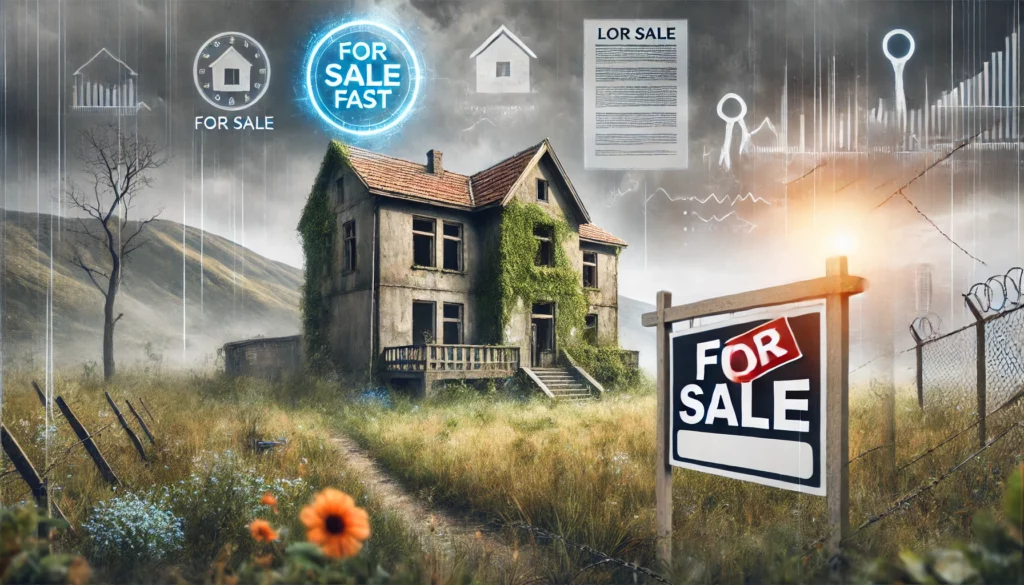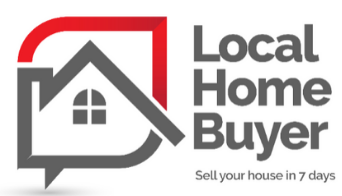Steps to Sell a Condemned Property Fast in Maryland

Introduction
If you’ve found your way to this article, it’s likely because you’re facing the difficult reality of owning a condemned property in Maryland, and you need to act fast. The process of selling a condemned house can be overwhelming, especially when considering the potential legal issues, repair costs, and the limited buyer pool for properties in such condition. You’re probably feeling the weight of a property that’s causing more headaches than it’s worth. Perhaps you’re wondering how to get rid of the house quickly without sinking a large sum into repairs or dealing with the lengthy process of listing it through a traditional realtor.
Most likely, you’re looking for a solution that’s efficient, straightforward, and financially sensible. You need to know what steps you should take to sell the property fast while avoiding unnecessary hassle, hidden costs, and long timelines. Whether you’re facing foreclosure, dealing with an inheritance situation, or just need to move on quickly, the goal is simple: sell your condemned property as quickly as possible for a fair cash price. In this article, we’ll guide you through the exact steps, with real-world examples and statistics, to ensure you get the most out of your sale—without all the drama. Additionally, we’ll show you why selling your condemned property to a reputable cash home buyer could be the ideal option. Let’s dive in.
Step 1: Understand the Condition of Your Condemned Property
Before you think about selling your condemned property, it’s important to fully understand the condition of the house. A condemned property is often uninhabitable and may have major structural issues, hazardous materials like asbestos, or severe water or fire damage. In Maryland, properties that are condemned often have significant health or safety concerns, making it even more critical to assess what’s wrong with the property.
Condemned houses come with substantial risks, and before you can sell, you need to make sure you’re aware of how serious the situation is. You don’t want to be blindsided by a sudden, last-minute inspection or legal issues. Conducting a professional inspection will help you understand the full scope of the repairs needed, what’s causing the condemnation, and whether there are any legal hurdles you need to overcome.
For example, let’s say your house has mold damage and the plumbing is non-functional. These are two common issues in condemned houses that can be incredibly expensive to fix. A major structural failure, like a collapsed roof or crumbling foundation, can cost tens of thousands of dollars to repair—costs that many homeowners simply can’t afford. With this in mind, you’ll want to figure out the cost of fixing the house versus selling it as-is for cash, as the latter may be a much more practical option.
You can learn more about common home repair costs at HomeAdvisor’s Cost Guide to get an estimate of what repairs might run you.
Remember, you have options, and the right strategy depends on how much you’re willing to invest in fixing up the property or whether you’d prefer a quick cash sale to avoid any further stress.
Step 2: Learn About the Legalities of Selling a Condemned House in Maryland
Selling a condemned property comes with its own unique set of legal considerations. In Maryland, a condemned property is often considered uninhabitable or dangerous, and it may require specific legal disclosures when transferring ownership. This can be a significant obstacle for many sellers, especially those who are unfamiliar with the process. In Maryland, the local government often condemns a property after it fails to meet building codes or presents a serious safety risk.
When selling a condemned property, one of the first things you’ll need to do is ensure that you comply with any local laws regarding disclosure and inspections. Maryland law requires you to disclose the condition of the property to potential buyers. For example, you may have to let a buyer know if the house is at risk of being demolished or if there are any major safety violations that need to be addressed. This transparency is important, as failing to disclose information could open you up to liability issues down the road.
Additionally, it’s important to note that in some cases, condemned properties can be difficult to sell through traditional real estate agents because the house may not meet the basic criteria for financing. Banks and other lenders often shy away from financing condemned properties due to the risks involved. This makes cash buyers an attractive option, as they are often willing to purchase properties in any condition, without requiring inspections or appraisals.
If you’re feeling confused or overwhelmed by the legalities, it might be a good idea to consult with a real estate attorney to ensure that you understand all the requirements and avoid any pitfalls that could derail your sale.
To learn more about the full process of selling a condemned property, including additional steps and common pitfalls, check out our detailed guide on How to Sell a Condemned House for Cash.
Step 3: Evaluate Your Selling Options: Realtor vs. Cash Buyer
Once you have a better understanding of the legalities and condition of the property, it’s time to evaluate your selling options. Traditionally, you might consider listing your condemned house with a real estate agent, but this option often doesn’t work for properties in poor condition. Why? Because most buyers who would be interested in your home will want it in livable condition, which may not be the case with a condemned property. Additionally, realtors often prefer homes that are in good shape, as they’re easier to sell and come with fewer risks.
Selling a condemned property through a realtor can take months or even longer. There’s the time it takes to get the property listed, wait for offers, and negotiate with potential buyers. Then, there’s the process of dealing with inspections and appraisals—an area where condemned properties often struggle. In some cases, the buyer might back out after receiving a negative inspection report, meaning you’ll have to start the process all over again.
On the other hand, selling your condemned property to a reputable cash buyer eliminates many of these headaches. Cash buyers don’t require financing, so there’s no waiting for loan approvals or worrying about buyers changing their minds after an inspection. Furthermore, cash buyers will usually buy the property as-is, meaning you won’t have to make any repairs before selling.
The speed of a cash sale is another advantage. While traditional sales may take months to close, a cash sale can close in a matter of weeks—or even days. This is especially beneficial if you’re under pressure to sell quickly due to foreclosure, debt, or other personal issues.
The downside of working with a cash buyer is that you may receive less money than you would through a traditional sale. Cash buyers typically offer a lower price, as they take on the risk of buying a condemned property. However, the quick, hassle-free nature of the transaction may outweigh the lower offer for many homeowners.
Step 4: Get an Accurate Cash Offer for Your Property
Once you’ve decided to sell to a cash buyer, the next step is to get an accurate offer for your property. Many cash buyers will provide free, no-obligation estimates for condemned homes. It’s important to gather offers from multiple buyers to ensure you’re getting a fair price.
When receiving offers, make sure to ask about all fees and costs associated with the sale. Some cash buyers may advertise a quick and easy sale but tack on hidden fees during the process. It’s essential to be fully aware of any deductions from your offer price before agreeing to move forward.
For example, a cash buyer might offer you $50,000 for your condemned property, but upon reviewing the agreement, you notice a 5% closing fee or additional charges for title transfer, bringing the final amount down to $47,500. Always ask for a breakdown of costs to avoid surprises down the road.
You also want to be aware of how long the buyer plans to take to close the sale. While most cash buyers close quickly, some may still take longer than expected, which can delay your plans if you’re in a rush.
For guidance on how to avoid hidden costs when selling your property, refer to this Bankrate article on Understanding Closing Costs.
Step 5: Close the Sale and Transfer Ownership
Once you’ve accepted an offer, the final step is to close the sale and transfer ownership of the property. This process is typically much faster than a traditional sale, as there’s no need for financing or lengthy negotiations. A reputable cash buyer will handle most of the paperwork for you, making the process as easy as possible.
However, before signing any contracts, ensure that everything is in order. Verify that all necessary legal documents are completed and signed, and that the sale is legitimate. If you’re uncertain about any part of the transaction, consider consulting a lawyer to review the contract.
Once the sale is closed, the buyer will handle the title transfer, and you’ll receive your cash payment. The money can be used to pay off debts, fund your next home, or simply move on with your life without the burden of the condemned property hanging over your head.
Conclusion: Why Selling a Condemned Property to Local Home Buyer Might Be Your Best Option
In conclusion, selling a condemned property can be an overwhelming and stressful experience. However, understanding the legalities, assessing your options, and working with a trusted buyer can make the process far less daunting. While traditional methods, like selling through a realtor or repairing the property, might seem like feasible options at first, they come with significant delays, costs, and risks—especially when dealing with a condemned house.
For many homeowners, the best option is to sell to a cash buyer like Local Home Buyer. We specialize in purchasing condemned properties as-is, meaning you don’t have to worry about costly repairs, inspections, or waiting for financing approval. Our process is fast, straightforward, and designed to give you a fair offer without the stress.
Selling to Local Home Buyer means you’ll be able to move forward quickly, with cash in hand and no further obligations. Whether you’re dealing with foreclosure, inherited property, or simply want to avoid the hassle of traditional sales, we’re here to provide you with a seamless experience.
If you’re ready to sell your condemned property without the headaches of repairs and long waiting periods, contact us today for a no-obligation cash offer. Let us help you close this chapter quickly and fairly, so you can focus on your next steps.
